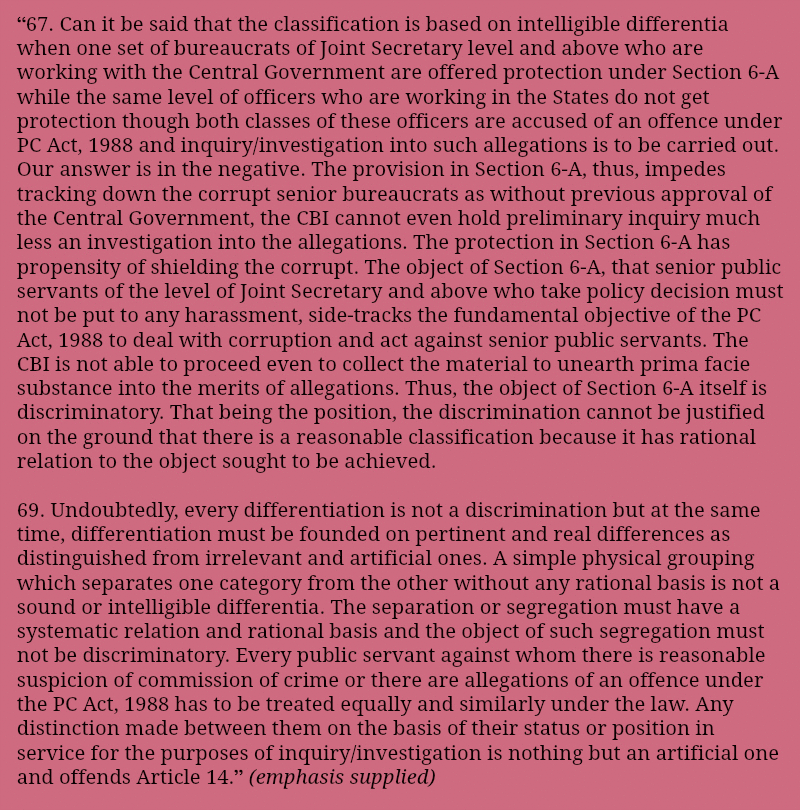 From the 1950s to the 1970s, constitutional issues were regularly decided by Constitution benches of the Supreme Court comprising of at least five judges. Today, such decisions have become rare. It is not uncommon to see the correctness of a decision from a bench of two or three judges on a constitutional issue questioned within a year or two by another bench of two or three judges, which then refers the question to a larger bench. A decision of a Constitution bench on the other hand, has the advantage of expressing a position of law that will prevail for much longer than a similar decision from a bench of two or three judges.
From the 1950s to the 1970s, constitutional issues were regularly decided by Constitution benches of the Supreme Court comprising of at least five judges. Today, such decisions have become rare. It is not uncommon to see the correctness of a decision from a bench of two or three judges on a constitutional issue questioned within a year or two by another bench of two or three judges, which then refers the question to a larger bench. A decision of a Constitution bench on the other hand, has the advantage of expressing a position of law that will prevail for much longer than a similar decision from a bench of two or three judges.
It was therefore refreshing to see a Constitution bench of the Supreme Court give a unanimous decision on May 6, 2014 in Subramanian Swamy v. Director, CBI, W.P. (Civil) No. 38 of 1997 and W.P. (Civil) No. 21 of 2004. The Court found that Section 6-A of the Delhi Special Police Establishment Act, 1946 (“DSPE Act, 1946”) was unconstitutional because it violated Article 14 of the Constitution of India.
Section 6-A was added to the DSPE Act, 1946 by Section 26 (c) of the Central Vigilance Commission Act, 2003 and provided that no investigation or enquiry could be conducted under the DSPE Act without the prior approval of the Central Government, in respect of allegations under the Prevention of Corruption Act, 1988 against employees of the Central Government above the level of Joint Secretary and officers appointed by the Central Government in corporations owned by it. Section 6A was challenged on the ground that it created a separate class of offenders and sought to protect them from investigation for corruption offences. The position that such a classification was not permitted was articulated by the amicus curiae Senior Advocate Anil Divan, Advocate Prashant Bhushan (an advocate in the 2004 petition), and Gopal Sankarnaraynan, an advocate for an intervenor. Interestingly, Subramanian Swamy, whose name the reported decision will bear, did not argue the matter in court, even through an advocate.
The response of the government, which was articulated by two of its law officers, was that higher bureaucrats in government and government owned corporations are responsible for important policy decisions and that such a protection was necessary to allow them to take decisions fearlessly without worrying about harassment through false criminal cases.
Speaking for the Court, Chief Justice of India R. M. Lodha held that the difference that was sought to be carved out between higher officials and lower officials in respect of prosecution for corruption cases was itself discriminatory and therefore, the classification envisaged in Section 6-A was devoid of intelligible differentia as the object of the intelligible differentia cannot be itself discriminatory. The Court found Section 6-A in violation of Article 14 on this ground alone and did not embark upon the second query of whether the intelligible differentia furthers the legislative objective of the enactment, because the legislative objective itself was discriminatory. The relevant finding of the Court (in paragraphs 67 and 69) is extracted below.
This finding can prove crucial for challenging the constitutionality of a range of provisions in legislations, where the political class has rather opportunistically protected itself from public scrutiny. Many of these provisions relate to election law, where through various amendments, a large number of exceptions have been provided to the political class from scrutiny, including scrutiny of funding and political expenses. The limit on expenses under Section 77 of the Representation of People Act, 1951 for example applies only to expenses made or authorised by candidates and not expenses made by the political party, leaving it open for political parties to flood elections with unaccounted money. Similarly, Section 13A read with Section 29C of the Income Tax Act, 1961 mandate disclosure of contributions made to political parties only when they are above Rs. 20,000. Political parties have misused this provision to hide their actual sources of income by showing most of their income as contributions below Rs. 20,000 from the sale of coupons to party workers.
Both these provisions are likely to fail the mandate that the object of the legislation or the amendment itself has to be non-discriminatory. This test, which has actually existed ever since the concept of “intelligible differentia” was envisaged, has been reinstated with this Constitution bench decision and now provides an important basis for challenging the constitutionality of those laws where the unconstitutional objectives of the provisions are writ large in the provision itself. All it will now take is for a willing court to describe the provisions of law for what they are – expressions of a discriminatory objective to give the powerful political class an advantage in the society.
(Shadan Farasat is an Advocate-on-Record at the Supreme Court of India)

